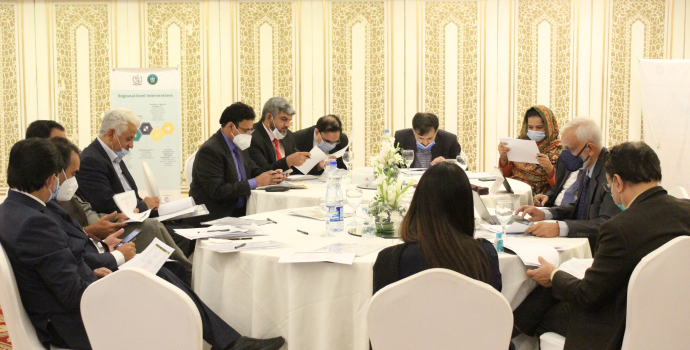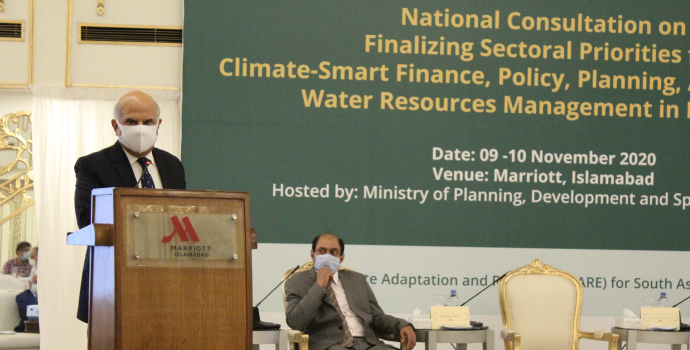- About Us
-
Who we are
-
- Publications
-
- ADPC Academy
-
MediaADPC'S NEWS
Pakistan’s climate resilience priority actions discussed under the CARE for South Asia project Pakistan’s climate resilience priority actions discussed under the CARE for South Asia project
10 - 11 Oct 2020
Islamabad, Pakistan

Government officials in Pakistan discussing the Climate Adaptation and Resilience (CARE) for South Asia Project.
Pakistan's Ministry of Planning, Development and Special Initiatives (MoPDSI) hosted a two-day national consultation on "Finalizing sectoral priorities for climate-smart financing, policy, planning, agriculture and water resources management in Pakistan" on 10-11 October 2020.
Organized under the Climate Adaptation and Resilience (CARE) for South Asia Project, the consultation brought together officials from finance, planning, agriculture, water, climate change, and disaster risk reduction sectors from federal and provincial levels.
The discussions at the consultation meeting were focused on the country’s policies for climate change and development, key priorities to be addressed under the project and the identification of ongoing programs and initiatives where CARE for South Asia can complement.
Asian Disaster Preparedness Center (ADPC) and the Regional Integrated Multi-Hazard Early Warning System for Africa and Asia (RIMES) are jointly implementing the project with financial support from the World Bank.
Pakistan is one of the most vulnerable countries to climate change in the world. The Government of Pakistan is striving to adopt an overarching climate resilience-centric approach for adaptation and mitigation activities in the country. CARE for South Asia will promote evidence-based climate-smart decision-making and enhance policies, standards and capacities for climate-resilient development in Pakistan.

Mr. Mohammad Jehanzeb Khan, Planning Commission Deputy Chairman, identifying CARE's potential in Pakistan.
Planning Commission Deputy Chairman Mohammad Jehanzeb Khan said that the project would analyze the impact of climate change on agriculture and water resources management and develop detailed policy options for adaptation and mitigation.
“Erratic rainfall, fluctuating temperatures and water scarcity can harm agricultural productivity, compelling the government to divert economic resources to import of essential grains,” said Mr. Mohammad Jehanzeb Khan. “These interventions would enhance agricultural productivity and ensure efficient water conservation and management at national and provincial levels,” he added.
The CARE for South Asia project aims to contribute to an enabling environment for climate-resilient policies and investments in South Asia. With a regional outreach, the project is being piloted in Pakistan, Nepal and Bangladesh.
The project will expand the Regional Resilience Data and Analytics Services (RDAS), strengthen Decision Support Systems (DSS) for climate resilience, and deliver training on a range of topics related to climate resilience. It will also provide advisory services for policy and investment interventions, promote climate-resilient design and standards and fund innovations for climate adaptation and resilience.
Latest NewsRelated Trainings
-